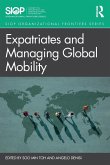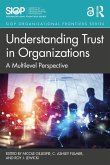Tackling precarious work has been described by the United Nations (UN)'s International Labour Organization (ILO) as the main challenge facing the world of work. In this ground-breaking book, leading applied research scholars, advocates, and activists from across the globe respond to this challenge by showing how Industrial and Organizational (I/O) psychology has a significant contribution to make in humanity moving away from precarious work situations towards sustainable livelihoods.
Broken down into four key parts on Sustainable Livelihoods, Fair Incomes, Work Security and Social Protection, the book covers a multitude of topics including the role of poor pay, lack of work-related security, social protection for human health and wellbeing, and interventions and policies to implement for the future of work. The volume offers a detailed look into useful and effective ways to tackle precarious work to create and maintain sustainable livelihoods. This curated collection of 22 chapters considers the broader relationships between previous research work and issues of human security and sustainability that affect workers, families, communities, and societies. Each chapter expands the present understandings of the world of precarious work and how it fits within broader issues of economic, ecological, and social sustainability.
In addition to I/O psychologists in research, practice, service and study, this book will also be useful for organizational researchers, labor unions, HR practitioners, fair trade, cooperative, and civil society organizations, social scientists, human security analysts, public health professionals, economists, and supporters of the UN SDGs, including at the UN.
Chapter 1 of this book is freely available as a downloadable Open Access PDF at http://www.taylorfrancis.com under a Creative Commons Attribution-Non Commercial-No Derivatives (CC-BY-NC-ND) 4.0 license.
Broken down into four key parts on Sustainable Livelihoods, Fair Incomes, Work Security and Social Protection, the book covers a multitude of topics including the role of poor pay, lack of work-related security, social protection for human health and wellbeing, and interventions and policies to implement for the future of work. The volume offers a detailed look into useful and effective ways to tackle precarious work to create and maintain sustainable livelihoods. This curated collection of 22 chapters considers the broader relationships between previous research work and issues of human security and sustainability that affect workers, families, communities, and societies. Each chapter expands the present understandings of the world of precarious work and how it fits within broader issues of economic, ecological, and social sustainability.
In addition to I/O psychologists in research, practice, service and study, this book will also be useful for organizational researchers, labor unions, HR practitioners, fair trade, cooperative, and civil society organizations, social scientists, human security analysts, public health professionals, economists, and supporters of the UN SDGs, including at the UN.
Chapter 1 of this book is freely available as a downloadable Open Access PDF at http://www.taylorfrancis.com under a Creative Commons Attribution-Non Commercial-No Derivatives (CC-BY-NC-ND) 4.0 license.
"Meaningful work, work that encourages a sense of belonging and builds capabilities for the future builds people's wellbeing, as well as providing the means to getting by. Precarious work puts these human needs at risk. Carr and colleagues provide real-life suggestions for supporting people to make sustainable livelihoods through good work".
Stewart Forsyth, Director: FX Consultants; I/O Net Australasia; and I/O Special Interest Group NZ
"Not so very long ago the term precarious work referred to a relatively small proportion of specific, scattered, particularly onerous jobs. Stuart Carr and his colleagues Veronica Hopner, Darrin Hodgetts and Megan Young, along with their many contributors, show us the unsettling variety of ways in which very many jobs in the 21st century are precarious. However, the aim of the book "is not solely to document work-related misery and hardship, but to shift discussion toward reforming precarious work." The book will be an important source and inspiration for those industrial-organizational psychologists (and others) who believe that their mission includes helping to assure that the world of work is as safe, just, healthy, challenging and fulfilling for workers as we can make it."
Joel Lefkowitz, Emeritus Professor of Psychology, Bernard M. Baruch College and The Graduate Center, CUNY, USA
"With so many challenges facing humanity every day, it is refreshing to see a volume that expresses hope and optimism for a brighter future for humanity. The editors of this volume and authors of the chapters in it lay out a roadmap for achieving such a future, based in principles of humanitarian work psychology. Of course, the way forward to a hopeful future and decent work is not going to be easy to achieve, I/O scholars and practitioners are in a unique position to begin this dialogue. This volume represents a well thought-through start to this conversation."
Neal M. Ashkanasy, Emeritus Professor of Management, Business School, University of Queensland, Australia
"Industrial and Organizational Psychology has a long tradition of responding to challenges of the day. The 22 contributions in this book, from leading researchers, practitioners and advocates for Decent Work under the UN Sustainable Development Goals, continue that tradition - and extend it to opportunities for the future through sustainable livelihoods."
Secretary of State Professor Gary Latham, Rotman School of Management, University of Toronto, Canada
Stewart Forsyth, Director: FX Consultants; I/O Net Australasia; and I/O Special Interest Group NZ
"Not so very long ago the term precarious work referred to a relatively small proportion of specific, scattered, particularly onerous jobs. Stuart Carr and his colleagues Veronica Hopner, Darrin Hodgetts and Megan Young, along with their many contributors, show us the unsettling variety of ways in which very many jobs in the 21st century are precarious. However, the aim of the book "is not solely to document work-related misery and hardship, but to shift discussion toward reforming precarious work." The book will be an important source and inspiration for those industrial-organizational psychologists (and others) who believe that their mission includes helping to assure that the world of work is as safe, just, healthy, challenging and fulfilling for workers as we can make it."
Joel Lefkowitz, Emeritus Professor of Psychology, Bernard M. Baruch College and The Graduate Center, CUNY, USA
"With so many challenges facing humanity every day, it is refreshing to see a volume that expresses hope and optimism for a brighter future for humanity. The editors of this volume and authors of the chapters in it lay out a roadmap for achieving such a future, based in principles of humanitarian work psychology. Of course, the way forward to a hopeful future and decent work is not going to be easy to achieve, I/O scholars and practitioners are in a unique position to begin this dialogue. This volume represents a well thought-through start to this conversation."
Neal M. Ashkanasy, Emeritus Professor of Management, Business School, University of Queensland, Australia
"Industrial and Organizational Psychology has a long tradition of responding to challenges of the day. The 22 contributions in this book, from leading researchers, practitioners and advocates for Decent Work under the UN Sustainable Development Goals, continue that tradition - and extend it to opportunities for the future through sustainable livelihoods."
Secretary of State Professor Gary Latham, Rotman School of Management, University of Toronto, Canada








